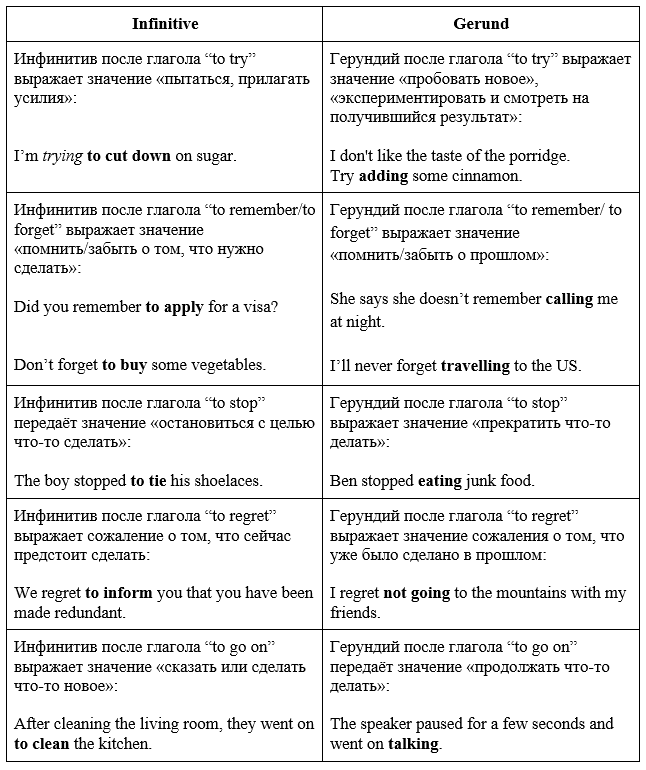Verbs: To-infinitives and -ing forms (changes in meaning)
Verb + to-infinitive or -ing form: change in meaning
 --
--
TO NEED
● I need to do something = it is necessary for me to do something
I need to finish the task by 5 pm.
I don’t need to worry, do I?
They need to be more careful with their words.
● Something needs to be done
Does your computer need charging?
This place needs cleaning.
Her laptop needs fixing.
TO HELP
● to help somebody (to) do something = to assist
Can you help me sweep the floor please?
She never helps me to look after the kids.
Valerie has helped her brother to draw a painting.
● can’t help doing something = I can’t stop myself doing something
They couldn’t help laughing at her little sister.
I can’t help binge-watching Criminal Minds.
He just can’t help making stupid comments.
TO FANCY
● Инфинитив после глагола “to fancy” используется в том случае, если вопрос гипотетический:
Which celebrity do you fancy to meet?
If you were an actor, which film would you fancy to star in?
● Герундий после глагола “to fancy” используется в том случае, если вопрос не гипотетический:
Do you fancy drinking some coffee?
I didn’t fancy spending money on a new computer.
TO LOVE / TO LIKE / TO HATE
Если мы говорим о повторяющихся действиях, то после глаголов “to love / to like / to hate” можно использовать либо инфинитив либо герундий:
 --
--
NB! Следует использовать герундий если мы говорим об актуальной ситуации:
Do you like being a father? (You are a father now - do you like it?)
My previous job was awful. I hated working there.
I like to do VS. I like doing
I like doing sth = I do it and I enjoy it
I like listening to classical music.
I like to do sth = I think it’s a good idea to do sth but I don’t necessarily enjoy it
It’s not my favourite thing to do, but I like to wash the dishes right after having dinner.
Verb + to-infinitive or -ing form: little or no change in meaning
to begin, to start, to continue, to intend, to bother
Natali intends buying a flat in Turkey. or Natali intends to buy a flat in Turkey.
The dog started barking. or The dog started to bark.
Don’t bother washing the dishes. or Don’t bother to wash the dishes.
NB! Лучше не ставить подряд два слова с окончанием -ing:
It’s starting to snow. (not It’s starting snowing.)
See somebody do something VS. See somebody doing something
1) Somebody did something + I saw it = I saw somebody do something
Я увидел/а как кто-то что-то сделал, от начала до конца.
I saw Margaret get on a bus.
She saw her husband send a message to somebody.
NB! После пассива инфинитив используется с частицей “to”:
She was seen to get on a bus.
He was seen to steal the bag.
2) Somebody was doing something + I saw it = I saw somebody doing something
Я видел/а, как он был в процессе какого-то действия.
I saw him eating at McDonald’s.
He told me he saw them waiting for a bus.
В некоторых случаях разница незначительна:
I’ve never heard her sing.
I’ve never heard her singing.